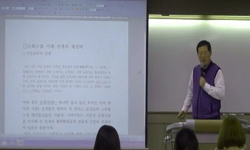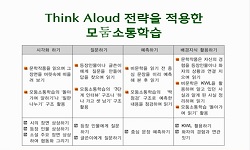The purpose of this study is to make students understand Korean classical novels by reading the context of culture. The discussion dealt in this paper is as follows; Ⅰ. Introduction, Ⅱ. Literature education and understanding the context of culture...
http://chineseinput.net/에서 pinyin(병음)방식으로 중국어를 변환할 수 있습니다.
변환된 중국어를 복사하여 사용하시면 됩니다.
- 中文 을 입력하시려면 zhongwen을 입력하시고 space를누르시면됩니다.
- 北京 을 입력하시려면 beijing을 입력하시고 space를 누르시면 됩니다.
문화적 맥락 읽기를 통한 고전소설 교육 방안 연구 = (A) Study on Educating Korean Classical Novel on the Context of Culture
한글로보기https://www.riss.kr/link?id=T13256892
- 저자
-
발행사항
부산 : 부산대학교, 2013
-
학위논문사항
학위논문(박사)-- 부산대학교 대학원 : 국어교육학과 2013. 8
-
발행연도
2013
-
작성언어
한국어
- 주제어
-
발행국(도시)
부산
-
형태사항
iv, 189 p. : 삽화 ; 26 cm
-
일반주기명
지도교수: 김병권
부록수록
참고문헌 : p. 158-166
서지적 각주 수록 - DOI식별코드
- 소장기관
-
0
상세조회 -
0
다운로드
부가정보
다국어 초록 (Multilingual Abstract)
The purpose of this study is to make students understand Korean classical novels by reading the context of culture. The discussion dealt in this paper is as follows; Ⅰ. Introduction, Ⅱ. Literature education and understanding the context of culture, Ⅲ. The reality of understanding the context of culture of classical novels, Ⅳ. The method of educating classical novels by understanding the context of culture, Ⅴ. The significance of educating classical novels by understanding the context of culture and Ⅵ. Conclusion. The contents for each part are as follows.
In ChapterⅠ, this study has suggested the need for the study and its purpose, preceding studies, and contents and methods of the study. After finding out Korean classical novels which fully show the context of culture, this writer examined the novels by the context of culture and approached the meaning of the novels. Most of the titles of Korean classical novels are main characters' name傳( ~ s story). Therefore, this study formulated the hypothesis that the novel writers intentionally created the name as the literary device. For the character of the classical novels can be the main elements when analyzing the works, this study examined the characters' personality, novels' construction, theme by naming, figured out the meaning and tried to seek the educational measures.
In Chapter Ⅱ, the paper tested the actual condition of the context of culture in curriculum and investigated the context elements for understanding the context of culture in the work. The meaning of the context', the standard of accomplishment and contents' elements in curriculum and textbook were all abstract and inappropriate for understanding the context of culture. In order to grasp what the context of culture is, the definition of the context, the context of culture is examined in this chapter. Education of understanding the context of culture is necessary because it can help students to figure out the precise meaning of the classical novels which holds the context of culture.
In Chapter Ⅲ, the paper studied <Hongildongjeon> and <Chunhyangjeon> which are the most frequently included in middle․high school textbook by the priciple of Wuxing[the Five Elements] and Yijing[The Book of Changes] and interpreted the work considering the context of culture. After analyzing characters' naming based on the context of culture of the time, it is confirmed that characters' personality, construction and theme were systematically related to each other. Four-stage plot[Wonhyungeejeong] according to the principle of Wuxing and 6-stage plot[Yukhyu] according to the principle of Yijing will present the new possibilities of plot theory of classic novels.
In Chapter Ⅳ, the paper suggested the method of educating classical novels by understanding the context of culture. This chapter chose the educational contents based on the analyzation of the work at the prior chapter. Phased educational method would not be described here in detail. First, it is necessary to select the elements of the context of culture to understand the personality of a person, the plot, and the theme. Second, it briefly shows a method to comprehend the meaning through reading the context of culture. This has not been taken up yet in the current curriculum, but it will be meaningful at a level that suggests a future curriculum.
In Chapter Ⅴ, this study proposed the significance of educating classical novels by understanding the context of culture. Reading the classical novels through the context of culture will ultimately enable students to accurately grasp the work. In other words, it can improve their rational analyzing capability and creative interpretation. Also, it would be the shortcut of the modernization․globalization of the classical novels because the writer of the novels got the creation principle in the thinking system of the time.
In Chapter Ⅵ, this study organized the result of the study and gave suggestion. The characters' life was accord with his/her name and so was the construction of the novel after researching the naming by the principle of Yinyang-Wuxing, and Yijing. This study gave new chances of interpretation and creation principle of classical novels as examining the context of culture of the classical novels, mainly character. Not only the capacity of understanding the works, but also did the study suggest the educational method and this would be meaningful to find out the value of the traditional culture by educating classical novels and to set the direction of Korean education. This is exactly why we should read the classical novels and also it is the goal of educating classical novels. There still remains the task, verification of learning stages by understanding the context of culture of the classical novels.
목차 (Table of Contents)
- 목 차
- Ⅰ. 서론 1
- 1. 연구 목적 1
- 2. 선행 연구 3
- 목 차
- Ⅰ. 서론 1
- 1. 연구 목적 1
- 2. 선행 연구 3
- 3. 연구 범위 및 방법 7
- Ⅱ. 문학 교육과 문화적 맥락 읽기 9
- 1. 교육과정과 문화적 맥락 9
- 1) 국가 수준 교육과정과 문화적 맥락 9
- 2) 교과서와 문화적 맥락 읽기 16
- 2. 문학 작품과 문화적 맥락 읽기 26
- 1) 문학 작품의 문화적 맥락 요소 26
- 2) 문화적 맥락 읽기를 통한 작품 수용 29
- Ⅲ. 고전소설의 문화적 맥락 읽기의 실제 36
- 1. <홍길동전>과 문화적 맥락 읽기 36
- 1) 오행의 원리를 고려한 작품 읽기 36
- 2) 주역의 원리를 고려한 작품 읽기 59
- 3) 문화적 맥락을 고려한 작품 해석 75
- 2. <춘향전>과 문화적 맥락 읽기 83
- 1) 오행의 원리를 고려한 작품 읽기 83
- 2) 주역의 원리를 고려한 작품 읽기 107
- 3) 문화적 맥락을 고려한 작품 해석 126
- Ⅳ. 문화적 맥락 읽기를 통한 고전소설 교육의 방법 130
- 1. 인물 성격과 문화적 맥락 130
- 1) 인물 성격에 간여하는 문화적 맥락 요소 130
- 2) 문화적 맥락 요소를 고려한 인물 성격 분석 131
- 2. 작품 구성과 문화적 맥락 137
- 1) 작품 구성에 간여하는 문화적 맥락 요소 137
- 2) 문화적 맥락 요소를 고려한 작품 구성 파악 138
- 3. 주제 형성과 문화적 맥락 141
- 1) 주제 형성에 간여하는 문화적 맥락 요소 141
- 2) 문화적 맥락 요소를 고려한 주제 파악 142
- Ⅴ. 문화적 맥락 읽기 교육의 의의 146
- 1. 고전소설에 대한 이해 능력 신장 146
- 1) 작품 내용의 합리적 분석 능력 146
- 2) 작품 주제의 창의적 해석 능력 148
- 2. 고전소설에 투영된 전통문화의 가치 발견 150
- 1) 고전소설 창작 원리로서의 전통문화 150
- 2) 고전소설 현재화・세계화 내용으로서의 전통문화 152
- Ⅵ. 결론 154
- 참고문헌 158
- Abstract 167
- [부록] 제7차 교육과정 ~ 2009 개정 교육과정 문화적 맥락 단원 분석 170










